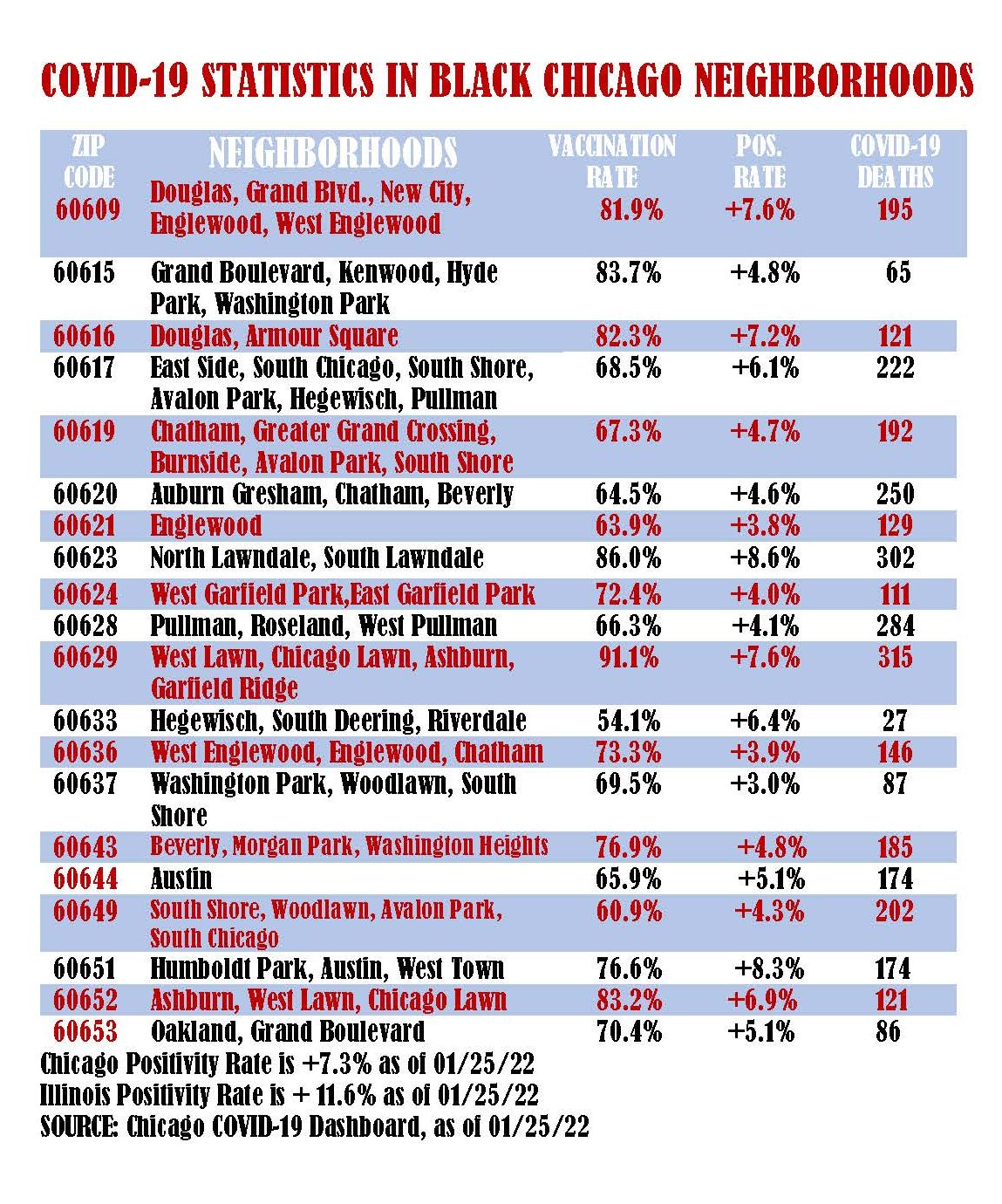While the COVID-19 positivity rate continues to drop in Chicago’s Black neighborhoods, the death toll in one week nearly doubled, to 125 casualties, according to a Crusader analysis of the latest data from the city’s COVID-19 dashboard.
Approximately 68 people died of COVID-19 in 20 Black zip codes last week. But the latest 125 deaths give a disturbing picture of a surge that continues to ravage Chicago’s Black neighborhoods even as spread of the coronavirus continues to decrease.
In just one week, five Black zip codes had deaths in the double digits. The highest was 60628 (Roseland, West Pullman and Pullman), where 14 people died within seven days of COVID-19, public health data show.
Three zip codes each had 11 COVID-19 deaths, including 60617 (East Side, South Chicago, Avalon Park, South Shore), 60620 (Auburn Gresham, Chatham, Beverly), and 60636 (Englewood, West Englewood, Chatham).
There were 10 deaths in zip code 60644, which covers the Austin neighborhood on the West Side.
Two zip codes each had eight COVID-19 deaths in one week. They include 60609 (Douglas, Grand Boulevard, Englewood, New City) and 60619 (Chatham, Greater Grand Crossing, Burnside, South Shore). At least seven Black zip codes had at least five deaths each.
In the previous, at least one death occurred in 19 of 20 Black populated zip codes. The latest week included at least two deaths in all 20 zip codes.
A total of 315 people died of COVID-19 in zip code 60629 (West Lawn, Chicago Lawn, Ashburn) since the pandemic began two years ago. In the North and South Lawndale neighborhoods (60623), a total of 302 people died from the disease. And the total death toll in the Roseland, Pullman and West Pullman neighborhoods (60628) is 284.
The vaccination rate in most of the Black zip codes continues to be among the lowest in Chicago. Four out of five zip codes that had COVID-19 deaths in the double digits had vaccination rates under 70 percent.
Amid the fatalities are positivity rates that continue to drop in Black neighborhoods.
As of January 25, all 20 Black zip codes had positivity rates in the single digits. Sixteen of those zip codes had positivity rates below the city average of 7.3 percent. All 20 had positivity rates below the state average of 11.6 percent. Zip code 60637 (Washington Park, Woodlawn) had the lowest positivity rate in the group at 3 percent.
On January 25, health officials in Philadelphia said the city is averaging 156 COVID-19 deaths per day in a week, the highest daily death toll than any point in the last year. On Monday, January 24, Detroit health officials reported the city had 36 COVID-19 deaths over three days. In Cleveland, 85 people died of the disease within a week, according to data from the New York Times.
Nationally, the seven-day average for newly reported COVID-19 deaths reached 2,258 a day on January 25. That’s up about 1,000 from daily death counts two months ago, according to data from Johns Hopkins University. That number is the highest since February 2021 as America was recovering from the worst of last winter’s wave.
The Centers for Disease Control and Prevention this week responded to reports that pharmacies across the country are turning away immune-compromised people when they come seeking fourth doses of COVID-19 vaccines.
The CDC urged pharmacies to stop the practice and encouraged millions of people with compromised immune systems to get them.
But many immune-compromised people tell CNN that pharmacies and hospitals have refused to give them fourth doses, leaving those most vulnerable to the virus without the protection the CDC wants them to have.
“A lot of pharmacies are just not understanding. They hear ‘fourth shot,’ and it just freaks them out,” said Elizabeth Nunn, who is immune-compromised and was turned away for a fourth shot by three pharmacies near her home north of New York City.
Last October, the CDC recommended fourth shots to people with immune-compromised systems.
The CDC estimates there are around 7 million immune-compromised Americans, including those with diseases like advanced HIV as well as those who take immune-suppressing drugs, such as organ transplant recipients and some people with cancer. Studies show that many of these patients did not have a full antibody response to two or even three doses of the COVID-19 vaccine.






